Mark Twain and the Mississippi River 马克吐温与密西西比河 教案Word版
- 格式:doc
- 大小:37.50 KB
- 文档页数:5
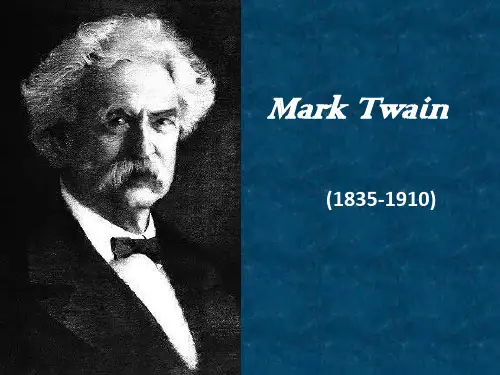

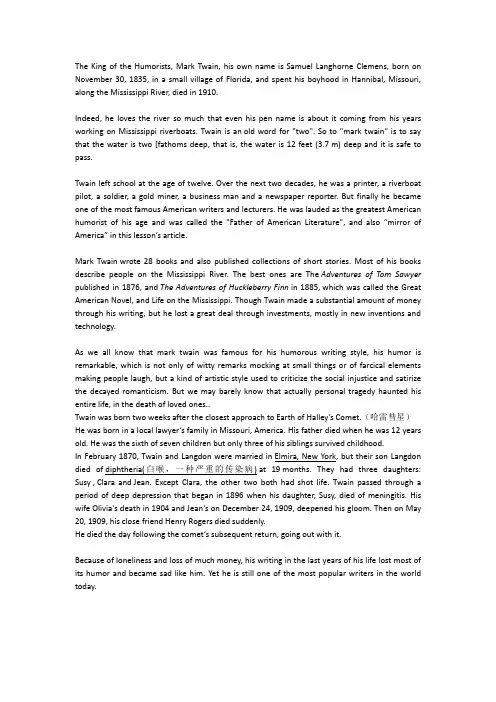
The King of the Humorists, Mark Twain, his own name is Samuel Langhorne Clemens, born on November 30, 1835, in a small village of Florida, and spent his boyhood in Hannibal, Missouri,along the Mississippi River, died in 1910.Indeed, he loves the river so much that evenhis pen name is about it coming from his years working on Mississippi riverboats. Twain is an old word for "two". So to "mark twain" is to say that the water is two [fathoms deep, that is, the water is 12 feet (3.7 m) deep and it is safe to pass.Twain left school at the age of twelve. Over the next two decades, he was a printer, a riverboat pilot, a soldier, a gold miner, a business man and a newspaper reporter. But finally he became one of the most famous American writers and lecturers. He was lauded asthe greatest American humorist of his age and was called the "Father of American Literature", and also “mirror of America” in this lesson’s article.Mark Twain wrote 28 books and also published collections of short stories. Most of his books describe people on the Mississippi River. The best ones are The Adventures of Tom Sawyer published in 1876, and The Adventures of Huckleberry Finn in 1885, which was called the Great American Novel, and Life on the Mississippi. Though Twain made a substantial amount of money through his writing, but he lost a great deal through investments, mostly in new inventions and technology.As we all know that mark twain was famous for his humorous writing style, his humor is remarkable, which is not only of witty remarks mocking at small things or of farcical elements making people laugh, but a kind of artistic style used to criticize the social injustice and satirize the decayed romanticism. But we may barely know that actually personal tragedy haunted his entire life, in the death of loved ones..Twain was born two weeks after the closest approach to Earth of Halley’s Comet.(哈雷彗星)He was born in a local lawyer‘s family in Missouri, America. His father died when he was 12 years old. He was the sixth of seven children but only three of his siblings survived childhood.In February 1870, Twain and Langdon were married in Elmira, New York, but their son Langdon died of diphtheria(白喉,一种严重的传染病) at 19 months. They had three daughters:Susy , Claraand Jean. Except Clara, the other two both had shot life. Twain passed through a period of deep depression that began in 1896 when his daughter, Susy, died of meningitis. His wife Olivia's death in 1904 and Jean's on December 24, 1909, deepened his gloom.Then on May 20, 1909, his close friend Henry Rogers died suddenly.He died the day following the comet’s subsequent return, goingout with it.Because of loneliness and loss of much money, his writingin the last years of his life lost most of its humor and became sad like him. Yet he is still one of the most popular writers in the world today.。


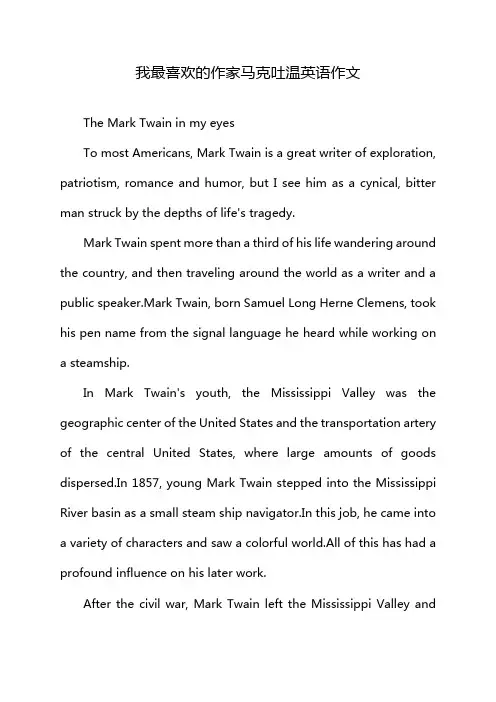
我最喜欢的作家马克吐温英语作文The Mark Twain in my eyesTo most Americans, Mark Twain is a great writer of exploration, patriotism, romance and humor, but I see him as a cynical, bitter man struck by the depths of life's tragedy.Mark Twain spent more than a third of his life wandering around the country, and then traveling around the world as a writer and a public speaker.Mark Twain, born Samuel Long Herne Clemens, took his pen name from the signal language he heard while working on a steamship.In Mark Twain's youth, the Mississippi Valley was the geographic center of the United States and the transportation artery of the central United States, where large amounts of goods dispersed.In 1857, young Mark Twain stepped into the Mississippi River basin as a small steam ship navigator.In this job, he came into a variety of characters and saw a colorful world.All of this has had a profound influence on his later work.After the civil war, Mark Twain left the Mississippi Valley andjoined the Confederate guerrillas.But the team tried to avoid fighting the enemy forces.Mark Twain left the team angrily.He came west again, lured by the gold rush in Nevada, but was eventually frustrated by his failure.After bankruptcy and frustration, he accepted his job as a reporter for the Virginia City Territory Development Newspaper, and then went into literature.Mark Twain began experimenting, but was forced to leave the city and flee to the gold mines in the Sacramento Valley.His depiction of the pioneers there made him accepted in the West Coast region.Mark Twain spent the winter of 1864 at the Angels mines.In boredom, he recorded a account of a story he heard that day that determines the course of his career:。
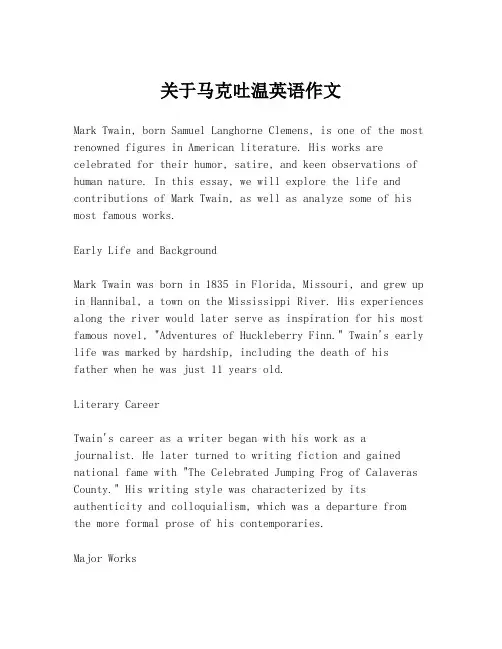
关于马克吐温英语作文Mark Twain, born Samuel Langhorne Clemens, is one of the most renowned figures in American literature. His works are celebrated for their humor, satire, and keen observations of human nature. In this essay, we will explore the life and contributions of Mark Twain, as well as analyze some of his most famous works.Early Life and BackgroundMark Twain was born in 1835 in Florida, Missouri, and grew up in Hannibal, a town on the Mississippi River. His experiences along the river would later serve as inspiration for his most famous novel, "Adventures of Huckleberry Finn." Twain's early life was marked by hardship, including the death of hisfather when he was just 11 years old.Literary CareerTwain's career as a writer began with his work as a journalist. He later turned to writing fiction and gained national fame with "The Celebrated Jumping Frog of Calaveras County." His writing style was characterized by its authenticity and colloquialism, which was a departure from the more formal prose of his contemporaries.Major Works1. "The Adventures of Tom Sawyer" (1876) - This novel is often considered a classic of American literature. It tells the story of Tom Sawyer, a mischievous boy growing up along the Mississippi River.2. "Adventures of Huckleberry Finn" (1884) - Often called "The Great American Novel," this work is a sequel to "Tom Sawyer" and follows the adventures of Huck Finn and Jim, a runaway slave, as they travel down the Mississippi River.3. "A Connecticut Yankee in King Arthur's Court" (1889) - This novel is a satirical look at society and politics, as a modern man is transported back in time to the court of King Arthur.Themes and StyleMark Twain's works often explore themes of innocence, identity, and the human condition. His use of satire to critique societal norms and his exploration of the moral complexities of life have made his works timeless.Influence and LegacyTwain's influence on American literature is immense. He is known for his wit and for his ability to capture the voice of the American people. His works continue to be studied and enjoyed around the world.ConclusionMark Twain was more than just a writer; he was a social critic, a humorist, and a keen observer of the human experience. His works have left an indelible mark on literature and continue to be celebrated for their humor, wisdom, and insight into the American spirit.In conclusion, Mark Twain's contributions to literature are vast and varied. His novels, short stories, and essays have not only entertained but also enlightened and provoked thought. As an English student, exploring Twain's works can offer a rich understanding of American literature and the societal context in which it was created.。

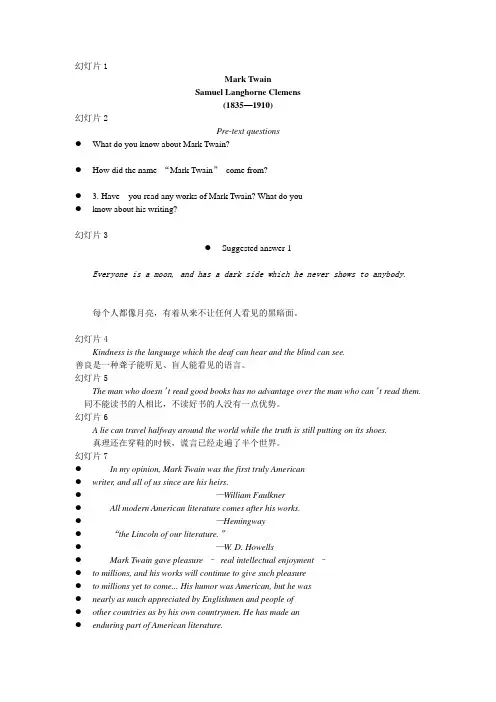
幻灯片1Mark TwainSamuel Langhorne Clemens(1835—1910)幻灯片2Pre-text questions●What do you know about Mark Twain?●How did the name “Mark Twain”come from?● 3. Have you read any works of Mark Twain? What do you●know about his writing?幻灯片3●Suggested answer 1Everyone is a moon, and has a dark side which he never shows to anybody.每个人都像月亮,有着从来不让任何人看见的黑暗面。
幻灯片4Kindness is the language which the deaf can hear and the blind can see.善良是一种聋子能听见、盲人能看见的语言。
幻灯片5The man who doesn’t read good books has no advantage over the man who can’t read them. 同不能读书的人相比,不读好书的人没有一点优势。
幻灯片6A lie can travel halfway around the world while the truth is still putting on its shoes.真理还在穿鞋的时候,谎言已经走遍了半个世界。
幻灯片7●In my opinion, Mark Twain was the first truly American●writer, and all of us since are his heirs.●—William Faulkner●All modern American literature comes after his works.●—Hemingway●“the Lincoln of our literature.”●—W. D. Howells●Mark Twain gave pleasure –real intellectual enjoyment –●to millions, and his works will continue to give such pleasure●to millions yet to come... His humor was American, but he was●nearly as much appreciated by Englishmen and people of●other countries as by his own countrymen. He has made an●enduring part of American literature.—President William Howard Taft幻灯片8The Chinese people are familiar with this writer because he was merciless in depicting the dark side of the Americansociety and because he stood firmly on the side of the Chinesein their struggle against foreign invasions.Which essay?Their essay “To the Person Sitting in Darkness” (1901) is a response to the Boxer rebellion in China. It is a scathingpolitical attack against imperialism.幻灯片9Suggested answer 2 &3●Twain's real name was Samuel Clemens. "Mark Twain",●which Means “watermark two", was a call used by sailors on●the Mississippi to warn shipmates that they were coming into●shallow water.●Running for Governor●The Adventures of Tom Sawyer●The Celebrated Jumping Frog of Calaveras County●The Million Pound Note●The Prince and the PauperThe Gilded Age幻灯片10Mark Twain and the Mississippi Mark Twain loved the great river so much that he alwayswent in the direction of the nearby Mississippi. Many of hisgreat works are set in the background of the MississippiRiver, such as The Adventures of Huckleberry Finn,The Adventures of Tom Sawyer, and Life on the Mississippi.幻灯片11幻灯片12幻灯片13幻灯片14Twain with His Wife●我是爱你的,倘使我失去你,那我的热情将追随着你而去,我的心灵将永远成为一片毫无生气的废墟。
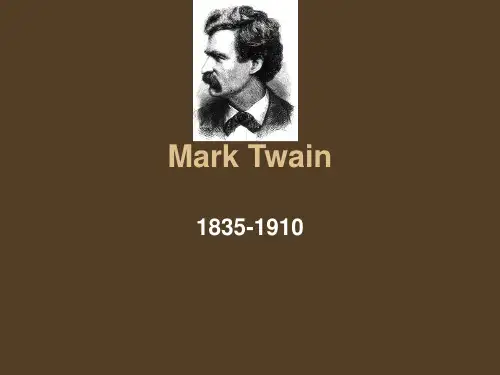
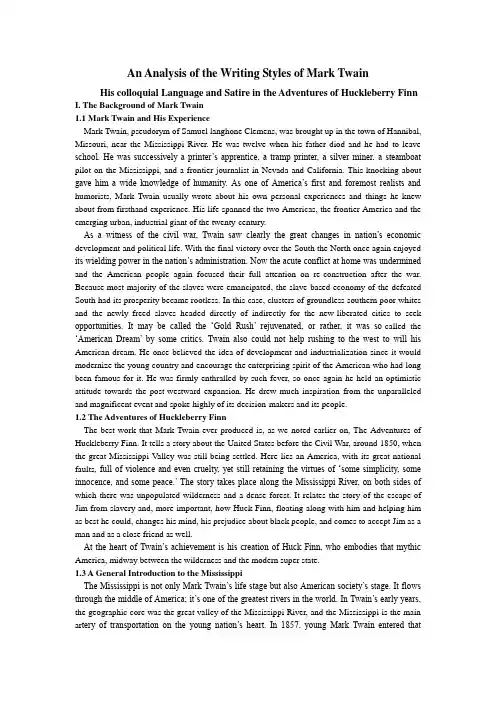
An Analysis of the Writing Styles of Mark TwainHis colloquial Language and Satire in the Adventures of Huckleberry FinnI. The Background of Mark Twain1.1 Mark Twain and His ExperienceMark Twain, pseudorym of Samuel langhone Clemens, was brought up in the town of Hannibal, Missouri, near the Mississippi River. He was twelve when his father diod and he had to leave school. He was successively a printer’s apprentice, a tramp printer, a silver miner, a steamboat pilot on the Mississippi, and a frontier journalist in Nevada and California. This knocking about gave him a wide knowledge of humanity. As one of America’s first and foremost realists and humorists, Mark Twain usually wrote about his own personal experiences and things he knew about from firsthand experience. His life spanned the two Americas, the frontier America and the emerging urban, industrial giant of the twenty-century.As a witness of the civil war, Twain saw clearly the great changes in nation’s economic development and political life. With the final victory over the South the North once again enjoyed its wielding power in the nation’s administration. Now the acute conflict at home was undermined and the American people again focused their full attention on re-construction after the war. Because most majority of the slaves were emancipated, the slave-based economy of the defeated South had its prosperity became rootless. In this case, clusters of groundless southern poor whites and the newly freed slaves headed directly of indirectly for the new-liberated cities to seek opportunities. It may be called the ‘Gold Rush’ rejuvenated, or rather, it was so-called the ‘American Dream’ by some critics. Twain also could not help rushing to the west to will his American dream. He once believed the idea of development and industrialization since it would modernize the young country and encourage the enterprising spirit of the American who had long been famous for it. He was firmly enthralled by such fever, so once again he held an optimistic attitude towards the post-westward expansion. He drew much inspiration from the unparalleled and magnificent event and spoke highly of its decision-makers and its people.1.2 The Adventures of Huckleberry FinnThe best work that Mark Twain ever produced is, as we noted earlier on, The Adventures of Huckleberry Finn. It tells a story about the United States before the Civil War, around 1850, when the great Mississippi Valley was still being settled. Here lies an America, with its great national faults, full of violence and even cruelty, yet still retaining the virtues of ‘some simplicity, some innocence, and some peace.’ The story takes place along the Mississippi River, on both sides of which there was unpopulated wilderness and a dense forest. It relates the story of the escape of Jim from slavery and, more important, how Huck Finn, floating along with him and helping him as best he could, changes his mind, his prejudice about black people, and comes to accept Jim as a man and as a close friend as well.At the heart of Twain’s achievement is his creation of Huck Finn, who embodies that mythic America, midway between the wilderness and the modern super state.1.3 A General Introduction to the MississippiThe Mississippi is not only Mark Twain’s life stage but also American society’s stage. It flows through the middle of America; it’s one of the greatest rivers in the world. In Twain’s early years, the geographic core was the great valley of the Mississippi River, and the Mississippi is the main ar tery of transportation on the young nation’s heart. In 1857, young Mark Twain entered thatworld as a cub pilot on a steamboat. Later, when he wented to write something, this land provided him with many plentiful writing materials.II. Analyzing Two Writing Styles of Mark Twain (in the Adventures of Huckleberry Finn) Mark Twain was the first important writer to consistently use the American speech rather than England’s English. His honor, whether it was aimed at pure entertainment or at social satire, was irresistible. His realism, and details influenced many later American novelists. That was why Ernest Hemingway once said “all modern American literatures came from one book written by Mark Twain called The Adventures of Huckleberry Finn.” And it became Twain’s masterpiece. Mark Twain’s three years’ life on that returned to the Mississippi left such a fond memory with him that returned to the theme more than once in his writing career. Huckleberry Finn is a veritable recreation of living models, and is H uck’s book, not Jim’s. The two major characters, Huck and Jim, represent the two sides of the dilemma: Huck strikes out for an absolute freedom, while Jim requires, in order to gain his own freedom, that Huck qualify his freedom by entering into the pursui t of Jim’s. It starts out as a comedy , an ‘As You Like It’ with a hero drawn from the bottom of society rather than the top. Huck and his father, Jim, the swindlers(the Duke and the Dauphin), colonel sherburn and the drunkard Boggy-all these characters prototypes in real life. The portrayal of individual incidents and characters achieved intense verisimilitude of detail. Serious problems are being discussed through the narration of a little illiterate boy. The fact that the wilderness juxtaposed with civilization, the people half wild and half civilized, many of whom are worse, vulgar, are brutal. As for the style of the book, the form is based on the simplest of all novel-forms, the so-called picaresque novel, or novel of the road, which strings its incidents on the line of the hero’s travels. But, in this novel, rivers are roads that move, and the movement of the road in its own mysterious life transmutes the primitive simplicity of the from: the road itself is the greatest character in this novel of the r oad, and the hero’s departures from the river and his returns to it compose a subtle and significant pattern. The Adventures of Huckleberry Finn shows us the major achievements of his art: the masterful use of dialects; humor and pathos, innocence and evil. This novel demonstrates his ability to capture the enduring, archetypal, mythic images of America and to create the most memorable characters in all of American fiction.2.1 Use of Colloquial LanguageThe book is written in a colloquial style, in the general standard speech of uneducated Americans. Moreover, the prose of Huckleberry Finn established the prose virtues of American colloquial speech. It has something to do with ease and freedom in the use of language. Most of all, it has to do with the structure of the sentence, which is simple, direct, and fluent, maintaining the rhythm of the word’s group of speech and the intonations of the speaking voice. Mark Twain’s colloquial style has influenced a large number of American writers.The Adventures of Huckleberry Finn displays the major achievements of his art: the carefully controlled point of view, with its implicit ironies expressed through the voice of a semiliterate boy: the masterful use of dialects: the felicitous balancing of nostalgic humorist and realism, humor and pathos, innocence and evil, all united for a journey down the Mississippi that serves as the mythic center of the novel. This novel demonstrates his ability to capture the enduring, archetypal, mythic images of America and to create the most memorable characters in all of American fiction.2.1.1 Vernacular LanguageMark Twain wrote in his unpretentious, colloquial, and poetic style. He used vernacular language, dialect with spelling representing pronunciation. Part of this comes from his interest inhumor. The directness of the language is a very influential point in Twain’s style. Ernest Hemingway in the 20th century said that he had learnt his craft from Mark Twain because if the direct speech and the direct narration that Twain was able to achieve. The hoax and tall tale are also part of twain’s style. Hoax is writing something fantastic and pretending that it were true, much like the tall tale. It tolls as if it were true, and so the reader would laugh that any body could believe such preposterous things, the burlesque making fun of establishes ways of writing.Mark Twain said, “I amend dialect stuff by talking and talking it till it sounds right.” He wanted his writing to have the sound of easy-going speech. In Huckleberry Finn the fountainhead of the American colloquial prose, he wrote seven different dialects and each can be distinguished. If the reader is a linguist, he can examine the different pronunciations that Twain has shown. In his own time, dialect writing was considered humorous. People got a big laugh out of reading these misspell words. Another feature of the book, which helps to make it famous is its language. The book is written in the colloquial style in the general standard speech of uneducated Americans.. Mark Twain’s introductory note on accents is an indication of his conscious attempt to achieve accurate detail. “In this book,” he says, “a number of dialects are used, to wit: the Missouri Negro dialect; the extreme forms of the backwoods southwestern d ialect; the ordinary ‘pike country’ dialect; and four modified varieties of this last. The shadings have not been done in a haphazard fashion, or by guesswork; but painstakingly, and with the trustworthy guidance and support of personal familiarity, with t hese several forms of speech.” “Painstaking ” and “not haphazard,” though they possess a humorous ring, denote the conscientious effort on the part of the author, and trustworthiness and familiarity and the author’s awareness of dialects in using which rev eal his attempt to reproduce actual daily speech with a degree of accuracy. A recent and very influential recasting of Huck’s vernacular voice has identified. We may quote a passage from this masterpiece as an illustration:“I took the sack of corn me al and took it to where the canoe was hid, and shoved the vines and branches apart and put it in; then I done the same with the side of bacon; then the whisky-jug. I took all the coffee and sugar there was, and all the ammunition; I took the wadding; I took the bucket and gourd; took a dipper and a tin cup, and my old son and two blankets, and the skillet and the coffee-pot/ I took fish lines and matches and other things- everything that was worth a cent. I cleaned out the place I wanted an ax, but there wa sn’t any, only the one out at woodpile, and I know why I was going to leave that. I fetched out the gun, and now I was done.”The words used here are, perhaps “ammunition” which is etymologically French, mostly Anglo-Saxon in origin, and are short, concrete and direct in effect. Sentence structures are most of them simple or compound, with a series of “then” and “ands” and semi-colons serving as connectives. The repetition of the word “took” and the stringing together of things leave the impression that Mark Twain depend solely on the concrete object and action for the body and movement of his prose. What is more, there is an ungrammatical element, which gives the final finish to his style. The whole book approximates the actual speech habit of an uneducated boy from south American of the mid-nineteenth century.The vernacular language in the Adventures of Huckleberry Finn initiated the new style of language in American novels, and has had significant influence upon American writers of later generations.2.1.2 Local ColorLocal color as a trend first made its presence in the late 1860s and early seventies. The vogue oflocal color fiction was, the logical combination of a long, progressive development. It was the outgrowth of historical and aesthetic forces that been gathering energy since early nineteenth century. Twain refers to the elements, which characterize a local culture, elements such as speech, customs, and also a particular place. Local colorists concerned themselves with presenting and interpreting the local character of their regions. They tended to identify and glorify, but they never forgot to keep an eye on the truthful color of local life.Twain depicted social life through descriptions of local places and people he knew best and believed that “the most valuable capital, or culture, or education usable in the building of novels is personal experience.” Yet, sometimes Twain wrote a sentimental story, not because he was sentimental, but because he wanted to show the reader how stupid such a story really was. The reader has to be very careful when he or she reads Mark Twain. Twain often played trick on the reader. He often said things when he meant just the opposite. This is the irony that he got the humor from the Far West. He would do things that he did just to make fun , but the reader might think that he really meant it. Then the reader was the tender-foot who taken in .Mark twain preferred to respect social life through portraits of local places which he knew best and drew heavily from his own rich fund of knowledge of people and places. The Adventures of huckleberry Finn is one such example. Finn is living breathing personality. It is through his use of language and his activities that Twain creates character and sets down objective truth: Finn is uneducated; he dislikes civilized ways because they are restrictive and hypocritical he likes. Meanwhile, local color mixed romantic plots with realistic descriptions of things which were readily observed, with the customs , dialects, sights, smell and sounds of regional America. After the Civil war, local color had further developed, In this book, this kind of literature mainly describes the local life, the keynote was optimistic, and the language was narrative humorous. The char acters he created were humorous and full of wittiness. Mark Twin’s work was regarded the witness of America’s pure local life. According to Calkins, “Few American writers have written the same after reading telling.” From my point of view, American literat ure is so charming for this kind of works.Local color became dominate in American Literature(1860-1870). One of the most important writing features of Mark Twain is the use of Local colorism. It is also impossible in the Mississippi River towns through which Huck and Jim journey to imagine being a hero .This in turn makes Sherborn a cold-blooded killer and Huck a saint (and Tom a good). Let me repeat it as a saint,however, Huck is no more bent on social reform, no more optimistic about it, than is sherburn. So local colorism is a variation of American realism, and also a description of a small refined region. Twain, breaking out of the narrow limits of local-color fiction, described the breadth of American experience as no one had ever done before, or since, and he created The Adventures of Huckleberry Finn, a masterpiece of American realism that proverbs to be one of the great books of world literature.2.1.3 PunIn English paronomasia called pun, means call by a different name. The exact definition is: Humorous use of word to suggest different meanings, or of words of same or similar sound has different meanings. There are five forms of pun: homophonic pun, paranomasic, antalaclasis, sylletic pun, asteismus. In a certain context, pun has several pragmatic functions. Throughout all of Twain’s writing, we see the conflict between the ideals of Americans and their desire for money. But Twain never tried to solve the conflict. He is like a newspaperman who reports what he sees.In this situation, his humor was often rather childish. This may bespeak why the critic P. Abel said:” Twain was a boy and an old man, but never was he a man.”In The Adventures of Huckleberry Finn, we can find many words and phrases that were used vividly to describe the things that happened, such as ‘I went along slow then, and I wasn’t right down certain whether I was glad I started or whether I wasn’t. This sentence is very interesting; pun is used to express the author’s mood at that moment. We can also use another kind of language to replace the original, but the effect is so different. So we can conclude that pun played an important role in this novel.2.2 Satire in The Adventures of Huckleberry FinnSatire is a way of criticizing people or ideas in a humorous way to show that they have faults or are wrong, or a piece of writing or play, which uses this style. In The Adventures of Huckleberry Finn, Twain shows satire on southern culture before the civil war, when the Mississippi valley was still being settled. Twain blended two different subjects, the experience of westward expansion and the experience of southern slavery. And he wrote about both regains of the country. His attitudes toward the south were much less pleasant than his attitudes toward the west, because he confronted the south problem of slave of mistreatment of humans by humans. Through the change of the white boy Huck’s attitude toward Jim, a runaway black slave, Twain condemned racial discrimination. Twain made fun of typical American values, yet underneath he felt a brooding pessimism not only about American valuable but also about life itself. It was a dreadful thing to see Human beings be awful cruel to one another. Due to Twain’s own experience, satire is successfully used in this novel. There’s one sign ificant scene which should be remembered, Huck Finn witnesses many instances of cruelty, brutality and hypocrisy in the township along the river Here are four points about his satire in this novel.2.2.1 VanityVanity in The Adventures of Huckleberry Finn has a perfect embodiment. Twain viewed the poor whites and showed the reader how these no-count whites thought they were better than black slaves. Many share-coppers just able to make enough money to live for these sorts of illusions. Vanity was the only thing that kept them above the slaves. Their standard of living in many cases was beneath that of slaves. The only thing that made them feel good about themselves was that they were white. And Twain made the reader laugh at the ludicrous idea that they were held. For Huck Finn, the journey on the raft with Jim was a voyage of moral discovery. At the early stage, Huck Finn looks upon Jim as a Negro slave with a common attitude. However, as they progress down the river, he changes his mind and no longer has prejudice against black people. He gradually comes to see Jim as a human being and begins to accept him as his friend. Yet Huck Finn never fully succeeds in breaking free from the prevailing attitude towards Negroes. As for this part, it’s a large contra st to the other people. Huck Finn rebels against the atrocious king and duke. He is disgusted with their trifling with human beings. It is because that Huck Finn is such a good and noble person that his moral dilemma in helping a Negro slave to escape constitutes a profound condemnation of the way of life and moral values of American south. His conscience has been formed by the morality of St. Petersburg and he never quite succeeds in freeing himself from that society’s corrupt standards. Huck Finn’s formed conscience is the measure of the moral corruption of the community that shaped. So he sinks into an inner struggle. He becomes increasingly caught between his friendship with Jim and the common social standards. Compare with others, Huck Finn’s goodness i s always unconscious and spontaneous, arising out of thedeepest recesses of his nature. He abuse cares about the welfare of others and cannot bear to see anyone suffer. He shows sympathy for the nicest of Peter Wilks and saves money for them. So the opposite character embodies vanity has come into the stage. However, humor could no more be found in Twain’s biter works. On the contrary, it was replaced by bitter satire, and vanity is an embodiment of Twain’s satire.2.2.2 Unquestioning Acceptance of ViolenceThe second object of satire is the genteel upper-class southerner. The genteel upper-class southerners don’t understand themselves, either. They lived a aristocratic life. In the novel, Granger fords are violent and hateful toward other people. Out of senseless perversion of a code of “honor”, they are involved in a feud, one that has been going on for generations with the shepherd sons. Its cause has been forgotten. Every Sunday, the shepherd sons and the Grange fords go to the same church. The shepherd sons sit on one side of their guns against the wall. And they listen to the preacher talk about brotherly love. When the sermon is over, they pick up their guns and they keep an eye on each other as they walk out the door so they will not get shot in the back. The satire is merciless, not only because these people are violent, but because they accept their violence as right. No one wants to reform. Huck keeps asking “Why?” It is just the way life is. This unquestioning acceptance of violence is the reason why Twain condemned southern society. The destruction and tyranny of Huck Finn’s father are other reasons for his escaping and desiring to be free. Huck Finn’s father is a part of that society with Huck Finn’s wishes. In contract to Miss Watson’s hypocr isy, his father presents the brutality and severity of civilization that threaten to destroy Huck Finn. His father believes that money and education are all the things of that time. Huck didn’t accept the violence from his father. Huck Finn’s freedom is mo dified by the presence of his father’s actions. Living in the woods, his father beats him quite frequently and sometimes leaves him locked up in the cabin for a long time. Once when his father returns from town, he is so drunk that he almost kills him. Huck Finn is mature enough to recognize the danger and only when he becomes convinced that his father represents immediate threat to his life does he decide to escape. Throughout his life plans to escape Huck Finn is more concerned for his life than anything else and prefers simply to disappear and begin a new life. Huck Finn’s desire to be free, at it’s deepest levels, and explores the possibility of an individual achieving true freedom in society. He is constantly forced to flee from a civilized society in order to preserve his sense of integrity and identity. It’s only when he is on the river in the group with Jim that flees secure and nature. Having escaped from the feud, he remarks that there is no home like raft and other places seem to be cramped up and smothery but a raft is. And he feels free and easy and comfortable very much on a raft. It is striking that whenever, Huck Finn comes into contact with the people along the river he is forced to assume a false identity. His initial escapes from his own cruel father and the society of St. Perterburry forces him to feign his own death. Brian Donnelly argues that Huck Finn’s true life could only be achieved by dying in the eyes of the people and by escaping down the Mississippi River. This is the way that Huck chose to the problem: violence.2.2.3 CowardThe violence on which southern culture rests is a pretence or illusion to disguise the basic cowardliness of the people and their refusal to act as individuals. Twain felt it even more deeply. People are vi olent, in Twain’s view, because they are cowards. Things are all mixed up in southern society, in any society, based on violence. It is a society without a leader. Twain’s attack on these people is bitter. In the middle part of this novel, the king and the duke were seriously evil; indeed,the long wilks episode is not funny. Had a lawyer Levi Bell, a precursor of Puddn’s head Wilson, not intervened, the outcome would have been dark in the measure of sherburn; in sherburn’s world there are no good people to be ruined. In Wilkses’ world, however, the good people are so powerless as the coward in Brecksville. The hopeless lambs offer no hope of betterment; they only measure its absence. Huck and Jim had left St. Petersburg with high hopes of freedom that are badly set back at cairo. The Willks episode ends in the utter defeat of these hopes. There seems to be no way to escape the duke and the king, the rest we have already discussed. Jim’s captivity is paralleled by Huck’s in thrall to Tom. It is on the very ve rge of the collapse of all possibility of freedom that Huck places his highest bid for it. Indeed, Jim has already been recaptures when Huck finds himself at last making the decision Twain had not been able to make at Cairo: “It was a close place,” he realizes, “I was a trembling, because I’d got to decide, forever, betwixt two things, and I knew it. I study a minute, sort of holding my breath, and then says to myself:’ All right, then, I’ll go to hell.’” Let us say the obvious: Twain has chosen the route of social engagement when it’s too late in the story to take it. Huck has decided when he is willing to go to hell, but the harder decision was whether to go to Ohio. All in all, Huck is not a coward, those people who want to use violence to attack others can be called coward. During that years, the whole American society upheavaled strongly, and this novel deeply depicted the experience of this kind of person, under Mark Twain’s writing, coward is so vivid to embody the features of that age. We can pay more attention on sherburn, a merchant and a military man, a double pillar of society—but in a society that does not deserve to be supported. On the contrary, it merits being brought crashing down, for all the reasons Huck has been exposing through the incidents of his journey. This is not a deformable society; one can only curse it and leave. Sherburn curse it and stays, and Twain finds himself approving the cursing and not knowing what to think of the staying. Does he see something of his own situation in Sherburn furious isolation among idiots and knaves? Sherburn, moreover, is not merely an inhabitant of society; as storekeeper and military man, he is presuming ably one of those who shape it. In Huck, Twain depicts on the contrary someone who has no power at all. Homeless and no money soon became an orphan. The real questions were not whether he will leave society but whether he will enter it and to what end? From his onto logical distance, Huck looks at the world of men with natural detachment. At his most critical he feels “ashamed of the human race”. Instead, sherburn sets about shaming the damned human race, hating its inescapable presence. The murder of Boggs, who is the lowest representation of humanity in sherburn’s eyes, expresses that hatred: he tells Boggs to be gone, but Boggs stays and sherburn can’t stand his presence another moment. What sherburn cannot do is himself leave, so as to be, like Huck, peacefully and even compassionately ashamed of the human race—away from it.2.2.4 SlaveAfter reading this novel, this book has been brought to my attention by a surprising assortment of people: blacks and whites. At that time, blacks played a role of slave. The common element in this encounter has not been the kind of people making statements, nor shared opinions or political perspectives, nor even their assessments of the article. Rather, they have been united by a virtually uniform structure in their narratives, suggesting an odd sort of sub-genre. Sometimes these persons report their own experience of reading the essay, and sometimes they describe the experience of one of their students. The reader likes the essay but feels troubled about this, not knowing whether the author is black. Uneducated black slave named Jim, the book relates thestory of the escape of Jim from slavery and, more important, how Huck Finn, floating along with him and helping him as best as he could, changes his mind, his prejudice about black people, and comes to accept Jim as a man and as a close friend as well. Meanwhile, Jim is very kindhearted. All of Huck’s virtues come from his good heart and his sense of humanity, for most of the things he was taught turned out to be wrong; for example, he was taught that slavery was good and right, and that runaway slaves should be reported, so what Huck has got to do is to cut through social prejudices and social discriminations to find truth for himself. Huck starts by believing that blacks are by nature lower than whites-inferior animals of sorts in fact. Through their escape down the river, he gets to know Jim better and becomes more and more convinced that he is not only a man, but also a good man. Thus he ends up by accepting him not merely as a human being but also as a loyal friend.2.3 A Combination of Colloquial Language and SatireTo sum up, fundamentally, Twain is a great American writer. The Adventures of Huckleberry Finn is an outstanding novel; one of the most successful writing styles is a combination of colloquial language and satire. In fact, most of Twai n’s works are the combination of both colloquial language and satire, but The Adventures of Huckleberry Finn was a case in point. On the other hand, it is his masterpiece as a humorist while the novel also can be eyed as a satire on sentimentality and Romanticism on the other. We have ever seen colloquial language and satire in some works, but no one’s writing is so appropriate like Twain’s. It displays American culture out of the ordinary and the attitude toward the entire society. In this book, the author use the first character to narrate, meanwhile colloquial language as the main writing language has come into the stage, in order to have the effect on vivid writing, satire is come out. In this situation, The Adventures of Huckleberry Finn displays the major achievements of his art: writing in a rich and intricate style that supported his intense scrutiny of complex human experience.Ⅲ. The Significance of Mark Twain’s Writing StylesColloquial language and satire are so important in this novel. This image of the quintessential American writing is not really literary goes along with a vision of the great American novel but as a sort of spontaneous telling of unmediated experience. In the same passage Hemingway explains that he has never been able to read Thoreau for being unable to read literary naturalists, only those who are extremely accurate. There aren’t nothing more to write about, and I am rotten glad of it, remarks Huck at the end of his story. The heart of Twain’s achievement is his cre ation of Huck Finn, who embodies that mythic America, midway between the wilderness and the modern super state. That was why Ernest Hemingway once said “all modern American literatures came from one book written by Mark Twain called The Adventures of Huckl eberry Finn.” And it became Twain’s masterpiece. In short, neither enlightenment nor retrospection elevates the style or the philosophy of Huckleberry Finn’s narrator into the high culture that has placed the work itself at its pinnacle. Ⅴ. ConclusionAs one of America’s first and foremost realists and humorists, Mark Twain usually wrote about his own personal experiences and things he knew about from firsthand experience. The Adventures of Huckleberry Finn is Twain’s best book because, for whate ver reasons, he brought together in it, with the highest degree of artistic balance, those most fundamental dualities running through his work and life from start to finish. Most of all it has to do with the structure of the sentence, which is simple, dire ct, and fluent, maintaining the rhythm of the word’s group of speech and the intonations of the speaking voice. Mark Twain’s colloquial style has influenced a。
介绍马克吐温一生的英语作文五年级Mark Twain, born Samuel Clemens in 1835, was a famous American writer. He grew up in Missouri along the Mississippi River, where he developed a love for storytelling. Twain is best known for his novels "The Adventures of Tom Sawyer" and "Adventures of Huckleberry Finn," which explore themes of adventure and friendship. He worked as a riverboat pilot and later as a journalist. Twain's humor and keen observations of society made him a beloved author. He passed away in 1910, leaving behind a rich legacy of literature.中文翻译:马克·吐温,原名塞缪尔·克莱门斯,出生于1835年,是一位著名的美国作家。
他在密苏里州的密西西比河沿岸长大,培养了对讲故事的热爱。
吐温以小说《汤姆·索亚历险记》和《哈克贝里·费恩历险记》而闻名,这些作品探讨了冒险和友情的主题。
他曾是一名轮船驾驶员,后来成为一名记者。
吐温的幽默感和对社会的敏锐观察使他成为一位受人喜爱的作家。
他于1910年去世,留下了丰富的文学遗产。
mark twain 生平简介英文马克;吐温,美国作家、演说家,美国批判现实主义文学的奠基人,下面是给大家整理的mark twain 生平简介英文,供大家参阅!mark twain 简介Mark Twain, American writer, orator, the real name is Samuel Langhorne Clemens. "Mark Twain" is his pen name, which was originally used by the Mississippi sailors to indicate the depth of water measured on the fairway. Representative works are novels "million pounds", "Huckleberry Fein adventure", "Tom Sawyer Adventures" and so on.Mark Twain at the age of 12, his father died, he had to stop, to the factory as a small worker Later he changed a lot of occupation, had done the Mississippi River navigator, miners and journalists work. Gradually began to write some interesting pieces, began his own writing career. He died on April 21, 1910, and was buried in Emma, New York.Mark Twain wrote a large number of works, themes related to novels, scripts, prose, poetry and other aspects. From the content, his works criticize the irrational phenomenon or the ugliness of human nature, expressed theright of the workers and sailors who have a strong sense of justice and the concern of ordinary people; from the style that the experts And the average reader thinks that humor and satire are his writing features. He experienced the United States from the initial capitalist to the development of imperialism, its ideas and creation also showed from the joking to the spicy satire and then pessimistic stage of development, early to spicy irony, to the late language is more exposed TheMark Twain is the founder of American critique of realism literature, and his main works have mostly Chinese translations. In 2006, Mark Twain was rated by the authoritative journal of the United States, "Atlantic Monthly" as the impact of the United States 100 characters 16mark twain 人物经历November 30, 1835, Mark Twain was born in the United States, Missouri, Florida, rural poor lawyers family. He is the sixth of seven children in the family. His father is a local lawyer, income is meager, family constraints. Mark Twain had to work while attending school. He died at the age of eleven years, and from then on he began an independent labor life, first in the printing plant as an apprentice, served asdispatchers and typists, and later on the Mississippi River as a sailor and helmsman.In the autumn of 1839, Mark Twain moved to a port of the Mississippi River in Hannibal, Missouri, which became his later book "The Adventures of Tom Sawyer" and "The Curse of Juveniles" St. Petersburg city inspired. At that time, Missouri was the federal slave state, and the young Twain began to understand slavery, which became the subject of his later adventures. Mark Twain is a color blind, which aroused his humorous jokes in social circles.March 24, 1847 Mark Twain's father John Clemens died of pneumonia. In 1847, the family of the young Mark Twain began to do the printing apprentice, newsboy, typist workers, sailors, gold rush workers, journalists and so on.In 1851, Mark Twain became a typist worker, and also contributed, and began to his brother Oliver founded the "Hannibal magazine" (Hannibal Journal) to write a draft.May 1, 1852 in Boston's humorous weekly "handbag" published his debut "the colonists surprised the playboy."In 1858, Mark Twain returned to Missouri. In the nextMississippi River to New Orleans on the road, the ship's navigator "Bisi than" to Twain life as a ship navigator.In 1861 Oulai Si was sent by President Lincoln to the Western Nevada government as secretary, he went with, trying to operate in the wood industry and mining wealth, are unsuccessful, then turn to write articles for a living. 1862 worked in a newspaper in the city of Virginia in Nevada.In 1863, began using the "Mark Twain" pen name.In 1864, in San Francisco met humor writer Ah Ward and novelist Bu Hart, get their encouragement and help, improve the writing skills.1865 in a New York magazine published a humorous story "Caravelas County famous jump frog", so that he is famous throughout the country. Afterwards often write humorous articles for the press.1866 to Hawaii Island interview.In 1867, a local newspaper provided a boat trip to the Mediterranean region. During his journey to Europe and the Middle East, he wrote a series of famous travel letters "fool travels" that were collected in 1869. In themeantime, he met Charles Langdon and saw the picture of Langdon sister Olivia Langdon, and Twain loved her at first sight.In 1870 Mark Twain married New York a daughter of the capitalist, Olivia Langdon. Married living in Buffalo, their own editor issued "Express", a year after the loss of money due to excessive transfer.Published in 1872 "hard years" a book, reflecting his new development in the western region of the life experience, which recorded some anecdotes, especially the rich characteristics of the western United States humorous story.In 1873 he and Charles Werner co-wrote the "gold-plated era", is his first novel.In 1871 Mark Twain moved his family to Hartford, Connecticut, where he became a famous writer and a humorous speaker. After a few years is his harvest of the harvest era.In 1875 Mark Twain wrote about William Dean Howells, author of the Atlantic Monthly. He wrote seven articles in the early years on the Mississippi River as the subject of the helmsman, and wrote a book, "The Past of theMississippi River." Eight years later, he returned to his hometown, expanding the book into the "Mississippi River" (1883).In 1876, the novel "The Adventures of Tom Sawyer" was published. Although it is a small town on the Mississippi River as a background of the juvenile reading, but for any age readers love. The book of naughty Tom and his partner Huckleberry Finn and Tom's girlfriend Baker's Thatcher's many stories, many of the author's personal experience, there are many children's psychological interesting plot.In 1876 Mark Twain's other important novel, The Adventures of Huckleberry Finn, began writing in 1884. This novel has been highly praised by critics, by domestic and foreign readersOf the welcome, but also continue to be banned.In 1889 Mark Twain published the "Connecticut American Americans" on the "King Arthur's court," and the "prince and the poor" (1881) were satirical feudal and religious novels based on the British as the background.In 1894, Mark Twain wrote "The Fool Wilson",which shaped the image of a struggling female niggarox. Before and after this family, his family was unfortunate: two daughters died of illness, his wife's health also deteriorated; he invested in the manufacture of automatic typewriter failure and bankruptcy. In order to pay off his debts, he traveled to Hawaii, New Zealand, Australia, India and South America.1896 published "Joan of Arc", it describes the 15th century French national hero hero Joan of Arc's life.1897 was written as "equatorial travel", which satirizes and condemns the imperialist oppression of the colonial people, against imperialism as the central idea of his subsequent creation.In 1898 Mark Twain paid off all the debts.In October 1900, after nearly ten years of leaving the United States living in Europe, he and his family returned to the United States, warmly welcomed and became the leader of the literary and art circles.After 1900, many of the works published, the edge has not yet cut.In 1904, his wife died in Italy. Mark Twain entered the final stage of the career. His early works such as "TheAdventures of Huckleberry Finn" have already expressed pessimism about "mankind" (indeed for the proletariat), and at this time became the subject of some of his works. (1906), the story of "mysterious visitor" (1916) and so on are reflected in the novella "Destroyed Hadley Fort" (1900), prose "how is it?" The most important work of his later years is his dictation, by his secretary transcribed "autobiography".April 21, 1910 Mark Twainin died of narrow heart disease.mark twain 生平简介英文。
The Mississippi River, the Symbol of American SpiritsThe Adventures of Huckleberry Finn, by Mark Twain, plays a very brilliant and predominant role in American literature. It is a novel of freedom and integrity. The story is about Huck Finn and Jim‟s adv entures journey down the Mississippi River on a raft. Huck is a white boy with a good heart, who escapes from being “civilized” and the maltreatment of his drunkard father. Jim is a runaway nigger, who is afraid of being sold. They are both forced to flee from the human society in order to be free. During the journey down the Mississippi River, they reveal their kindness by nature and establishes a profound relationship, but their isolating “society” is constantly disturbed and suffering the wicked acts fro m the banks of the “civilization society”. Relying on their wisdom and courage, they obtain freedom in the end. By contrasting the two kinds of societies, Twain thoroughly disclosed the hypocrisy of freedom and democracy in American society of his age. On the other hand, he showed his admiration to the people, both whites and blacks, with the spirit of bravely fighting for freedom and integrity. The theme in this novel, indeed, is that all of men, whites or blacks, should live in a truly democratic country.Beneath that theme, Mark Twain also succeeds in portraying the Great Mississippi River which carries Huck and Jim to beautiful, but sometimes it is so violent ferocious and terrible. It seems to be anembodiment of some spirits.“Some critics, notab ly T. S. Eliot and Lionel Trilling, have gone so far as to see in the River a kind of symbolic deity, a power sufficient to itself. The River …is not ethical or good,‟ Trilling says, but it helps goodness grow in those people who make it an important element in their lives.”1While T. S. Eliot has a more profound understanding of the Mississippi River in this novel.“Eliot maintains that the River dominates the structural form of the novel. The River is used metaphorically, structurally and thematically. Huck sees the big River gliding by and is suffused with a sense of awe and majestic calm. All adventures begin and end on the River. Jim‟s freedom------the central point of the novel------involves a journey down the River.”In my opinion, the image of the Mississippi River is skillfully endowed with rich American national spirits and cultural connotations. In fact, Mark Twain uses the Mississippi River in this novel on purposes. And I think there are an objective factor. The former is that the Mississippi River has been contributing a lot to American History; and the latter, Twain‟s personal nostalgia for his boyhood and piloting days on the River.On the other hand, the name of the Mississippi has extended meaning. Inthe days before the Civil War, the River was the major channel of trade and communication in the whole country. In history, the Mississippi played a very important role in the lives of the aboriginal people settled on its banks. Another contribution to American History by the Mississippi should also be respected. The European explorers of the river appeared in 16 century. But their grasp on the Mississippi was never firm.The Mississippi River‟s unique contribution to American History is symbolically used in the novel of the Adventures of Huck Finn. There, Mark Twain makes the Mississippi as a symbol of an eternal God embodying the key spirits of American Nation. “…the great Mississippi, the majestic, the magnificent Mississippi, tolling its mile-wide tide along.” In Twain‟s heart, she l oves freedom and seeks for the true, the good and the beautiful. So she shows her maternal love and care to the people, who is kind and brave by nature and eager for freedom; but she hates evil and punishes them with her power. She even purifies the spirit of people, and create new birth by her transcendental gift.。
Mark Twain and the MississippiRiverPart One: The Mississippi1.Show maps and scenery of the river2.Brief IntroductionThe Mississippi River, 3,779 km (2,348 mi) long, is the second longest river, after the Missouri, in the United States. Its triangular drainage area, covering about 40% of the country and including all or part of 31 states, is approximately 3,250,000 sq km (1,250,000 sq mi), the third largest in the world. The Mississippi rises in Minnesota and then flows south, following the boundaries between the states of Minnesota, Iowa, Missouri, Arkansas, and Louisiana on the west, and Wisconsin, Illinois, Kentucky, Tennessee, and Mississippi on the east. The river, whose name means "father of waters" in the Algonquian language, has long been an important transportation artery of North America.3.The River and Life(1)the effect of the Mississippi :Throughout its history, the Mississippi has always been a major navigation route through the center of North America.It has served as the border for New France, New Spain, and the early United States,Even today, the river serves as partial boundaries for ten states, and most of its course can easily be seen on a political map.Just as its name “The Father of Waters”says, the Mississippi River washes the center plain and provides the richest soil for his people.As the body of a nation, the Old Blue influences the country a lot with its natural and spiritual power.(2)both sides of the Mississippiformed the nation but brought into disasterflowing right through the heart of America, bringing great wealth to the country but great suffering and hardship as well.The river dominates almost the whole American land, but its south part that dominates the whole nation’s culture and life.4.The Mississippi River, the Symbol of American SpiritsThe Adventures of Huckleberry Finn, by Mark Twain, plays a very brilliant and predominant role in American literature. It is a novel of freedom and integrity. The story is about Huck Finnand Jim‟s adventures journey down the Mississippi River on a raft. Huck is a white boy with a good heart, who escapes from being “civilized”and the maltreatment of his drunkard father. Jim is a runaway nigger, who is afraid of being sold. They are both forced to flee from the human society in order to be free. During the journey down the Mississippi River, they reveal their kindness by nature and establishes a profound relationship, but their isolating “society”is constantly disturbed and suffering the wicked acts from the banks of the “civilization society”. Relying on their wisdom and courage, they obtain freedom in the end. By contrasting the two kinds of societies, Twain thoroughly disclosed the hypocrisy of freedom and democracy in American society of his age. On the other hand, he showed his admiration to the people, both whites and blacks, with the spirit of bravely fighting for freedom and integrity. The theme in this novel, indeed, is that all of men, whites or blacks, should live in a truly democratic country.Beneath that theme, Mark Twain also succeeds in portraying the Great Mississippi River which carries Huck and Jim to beautiful, but sometimes it is so violent ferocious and terrible. It seems to be an embodiment of some spirits.“Some critics, notably T. S. Eliot and Lionel Trilling, have gone so far as to see in the River a kind of symbolic deity, a power sufficient to itself. The River …is not ethical or good,‟Trilling says, but it helps goodness grow in those people who make it an important element in their lives.”While T. S. Eliot has a more profound understanding of the Mississippi River in this novel.“Eliot maintains that the River dominates the structural form of the novel. The River is used metaphorically, structurally and thematically. Huck sees the big River gliding by and is suffused with a sense of awe and majestic calm. All adventures begin and end on the River. Jim‟s freedom------the central point of the novel------involves a journey down the River.”Question:What happened between Mark Twain and the Mississippi ??Part Two:Mark Twain1.Mark Twain and the MississippiMark Twain was born in Florida. The Mississippi River , flowing though the state,exerts a tremendouus influence on him.The beautiful sight and the colorful life as well as cast of characters are all quite familiar to Mark Twain.Therefore the Mississippi River produces great regional impact on Mark Twain’s literary creation .Mark Twain takes the Mississippi River as the carrier of his classic words,shapes his unique writing style and at the same time bestows specific meaning on the river.Mark Twain loved the great river so much that he always went in the direction of the nearby Mississippi. Many of his great works are set in the background of the Mississippi River, such as The Adventures of Huckleberry Finn, The Adventures of Tom Sawyer, and Life on the Mississippi.2.Mark Twain –Mirror of America(1)Who was Mark Twain ? Where did his pen name come from?Born Samuel Langhorne Clemens, 1835–1910.He was an American author,a humorist, narrator, and social observer.Twain is unsurpassed in American literature.His novel The Adventures of Huckleberry Finn, a masterpiece of humor, characterization, and realism, has been called the first (and sometimes the best) modern American novel.After the death of his father in 1847, young Clemens was apprenticed to a printer in Hannibal, Mo., the Mississippi River town where he spent most of his boyhood.He first began writing for his brother’s newspaper there, and later he worked as a printer in several major Eastern cities.In 1857, Clemens went to New Orleans on his way to make his fortune in South America, but instead he became a Mississippi River pilot—hence his pseudonym, “Mark Twain,”which was the river call for a depth of water of two fathoms.two fathoms deep a boatman’s signal called up from the bow where the leadsman was sounding the river’s channel with his line. “Mark Twain”meant the second mark, or 12 feet deep, enough water to float any steamboatFor most people, the name "Mark Twain" is virtually synonymous with the life along the Mississippi River immortalized in the author's writing. Clemens first signed his writing with the name in February 1863, as a newspaper reporter in Nevada.(2)His Life PrinterPilotSoldierMinerReporterWriterMark Twain had led an active life,in the very center ofthe American experience.(3)His Major Works1.The Notorious Jumping Frog of Calaveras County (1865)2.Innocents Abroad (1869)3.Roughing It (1872)4.The Gilded Age (with Charles Dudley waenner,1873)5.The Adventures of Tom Sawyer (1876)6. A Tramp Abroad (1880)7. The Prince and the Pauper (1882)8.Life on the Mississippi (1883)9.The Adventures of Huckleberry Finn (1884)10.The Tragedy of Pudd’nhead Wilson (1894)11. A Connecticut Yankee in King Arthur’s Court (1889)12. The Man that Corrupted Hadleyburg (1900)13.What Is Man? (1906)14. The Mysterious Stranger (1916)15. Personal Recollections of Joan of Arc (1896)16. Following the Equator (1897)(4)Life on the Mississippi0riginally published in 1883, Life on the Mississippi is Mark Twain's memoir of his youthful years as a cub pilot on a steamboat paddling up and down the Mississippi River.Twain used his childhood experiences growing up along the Mississippi in a number of works, including The Adventures of Tom Sawyer and The Adventures of Huckleberry Finn, but nowhere is the river and the pilot's life more thoroughly described than in this work.Told with insight, humor, and candor, Life on the Mississippi is an American classic.(5)Book ReviewLife On the Mississippi is perhaps his middle-aged, nostalgic look-back to the long gone days of his youth.Twain looks back from a distance of twenty years, back to his days as a steamboat pilot on the Mississippi River.From 1857 to 1861 Twain learned and worked and lived on steamboats traveling the river from St. Louis to New Orleans.Yet a mere twenty years later, he must have surely recognized that the 'glory days' of the steamboat on the Mississippi were already gone, for him and for his countryLife on the Mississippi is full of stories.Stories of the geological history and the discovery and exploration of the river by man.Stories of Twain's early days as a boy on the river and the characters known and admired or censured from those early days.Stories from his days living and working on the river, as a 'cub pilot', as a respected working pilot, and—returning twenty years later—as a visitor seeing for himself the changes wrought on the river.Stories of the changes produced by the hand of man, straightening and deepening and channeling the river; changes forced by the development of tow-boats and railroads; changes perhaps best seen from the distance of time.That’s all.Thank you.。